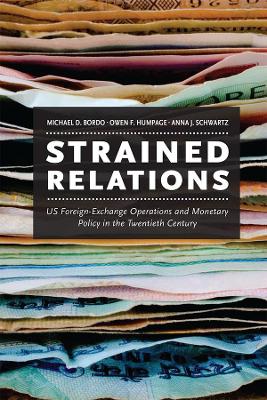NBER-Monographs (CHUP)
2 total works
Strained Relations
by Michael Bordo, Owen F. Humpage, and Anna Jacobson Schwartz
Published 1 January 2015
Drawing on a trove of previously confidential data, Strained Relations reveals the evolution of US policy regarding currency market intervention, and its interaction with monetary policy. The authors consider how foreign-exchange intervention was affected by changing economic and institutional circumstances - most notably the abandonment of the international gold standard - and how political and bureaucratic factors affected this aspect of public policy.
Modern monetary economics has been significantly influenced by the knowledge and insight brought to the field by the work of Anna J. Schwartz, an economist whose career has spanned almost half a century. Her contributions evidence a broad expertise in international history and policy, and an ability to apply the results of her careful historical research to current issues and debates. Money in Historical Perspective is a collection of sixteen of her papers selected by Michael D. Bordo and Milton Friedman. Grouped into three sections, the essays constitute a number of Dr. Schwartz's most cited articles on the subject of monetary economics, many of which are no longer readily accessible.
In the papers in part I, dating from 1947 to the present, Dr. Schwartz examines money and banking in the United States and the United Kingdom from a historical perspective. Her investigation of the historical evidence linking economic instability to erratic monetary behavior—this behavior itself a product of discretionary monetary policy—has led her to argue for the importance of stable money, and her writings on these issues over the last two decades form part II. The volume concludes with four recent articles on international monetary arrangements, including Dr. Schwartz's well-known work on the gold standard.
This volume of classic essays by Anna Schwartz will be a useful addition to the libraries of scholars and students for its exemplary historical research and commentary on monetary systems.
In the papers in part I, dating from 1947 to the present, Dr. Schwartz examines money and banking in the United States and the United Kingdom from a historical perspective. Her investigation of the historical evidence linking economic instability to erratic monetary behavior—this behavior itself a product of discretionary monetary policy—has led her to argue for the importance of stable money, and her writings on these issues over the last two decades form part II. The volume concludes with four recent articles on international monetary arrangements, including Dr. Schwartz's well-known work on the gold standard.
This volume of classic essays by Anna Schwartz will be a useful addition to the libraries of scholars and students for its exemplary historical research and commentary on monetary systems.

